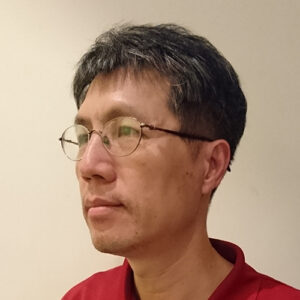 This is the ninth in the series of short statements from candidates in the coming CODATA Elections at the General Assembly to be held on 27-28 October 2023. Tyng-Ruey Chuang is a candidate for the CODATA Executive Committee as an Ordinary Member. He was nominated bby the Academy of Sciences located in Taipei.
This is the ninth in the series of short statements from candidates in the coming CODATA Elections at the General Assembly to be held on 27-28 October 2023. Tyng-Ruey Chuang is a candidate for the CODATA Executive Committee as an Ordinary Member. He was nominated bby the Academy of Sciences located in Taipei.
I, Tyng-Ruey Chuang, was elected to the CODATA Executive Committee as an Ordinary Member in 2018 and again in 2021. For the five years since I was first elected, I have had the privilege and pleasure working with colleagues in the CODATA Executive Committee and Secretariat, the CODATA members, and various data communities in advocating for greater research data sharing and reuse.
I wish to continue my service in CODATA to advance public and equitable access to research data, and to collaborate with the broader data communities to work forward a world where more data can be shared for the mutual benefits of the people. Today’s data landscape is changing very fast: Datasets from diverse sources – sciences, governments, businesses, citizens, etc. – are being used together to address pressing environmental and societal issues. As a society, we cannot say, however, that all useful datasets are now easily accessible and reusable to all people.
CODATA, as a multidisciplinary scientific body working with (and within) the International Science Council, is at a unique position to make strides in realizing the data for social good vision. To work toward this vision, CODATA would need to connect more to social sciences and humanities research associations, as well as to the global civil society. In particular, CODATA would need to engage with research institutions in Low- and Middle-income Countries (LMIC) and to actively seek participation from underrepresented research communities.
For the last 25 years I have been working with researchers from multiple disciplines on data management systems, copyrights and public licenses, open data policies, and research data infrastructures. I mostly work on collaborative projects. A central goal of these collaborations, always, is to make better use of research data. My training and experience in information science and engineering aligns strongly with the CODATA missions.
I collaborated with the Taiwan Biodiversity Research Institute on a communal data workflow for the Taiwan Roadkill Observation Network. The project received a National Agricultural Science Award in 2019. Our work on the Sunflower Movement Archive has contributed to a year-long special exhibition at National Museum of Taiwan History on Social Movements in Post-War Taiwan. Both collaborations emphasize community involvement and the public’s access to research materials. We build and operate the depositar, an open repository freely available to researchers worldwide for the deposit, discovery, and reuse of research datasets.
I had been the public lead of Creative Commons Taiwan since its beginning in early 2003 until its transition to a community project in 2018. I co-led the Open Source Software Foundry (2003-2017). These two long-running projects were supported by Academia Sinica in Taipei to outreach to the general public, researchers, and policy makers in Taiwan about the principles and practices of public licenses and free software. Capacity building is an integral part of the two projects.
In addition to being a member of the CODATA Executive Committee (2018 – 2023), I served in CODATA’s International Data Policy Committee (2014 – 2019) and co-chaired the CODATA–WDS Task Group on Citizen Science and the Validation, Curation, and Management of Crowdsourced Data (2016 – 2018). The 2012 CODATA International Conference was held in Taipei; I led a team in Taiwan working with the CODATA Secretariat to organize the conference to a great success.
I am an Associate Research Professor at the Institute of Information Science, Academia Sinica, Taiwan, with a joint appointment at both the Research Center for Information Technology Innovation and the Research Center for Humanities and Social Sciences. I was a fellow at the Berkman Center for Internet and Society, Harvard University, supported in part by a Fulbright senior research grant (2011-2012). I am on the Advisory Committee of Academia Historia, Taiwan. For several times I served as a board member of the Taiwan Association of Human Rights and of the Software Liberty Association of Taiwan.
I have published about 100 research articles. I frequently write for the general public on the topics of Internet (technologies and cultures), digital preservation, and data collaboration, among others. Here is a sampler of my writings for the public: on Open Access to Knowledge during Public Health Emergencies (in Chinese), on Openness, and on Planning for Long-Term Access to COVID-19 Memory Websites.
